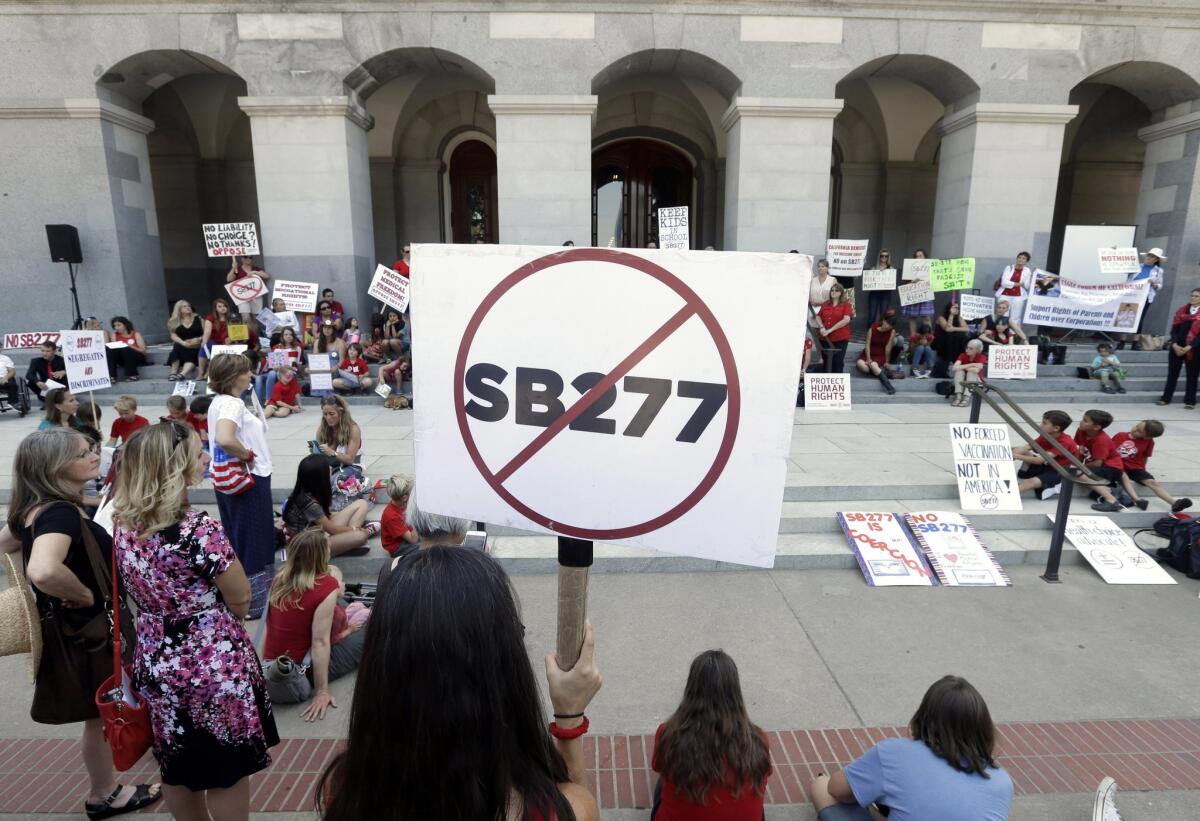Local officials react to vaccine law

Opponents of a measure requiring nearly all California school children to be vaccinated gathered on the west steps of the Capitol after lawmakers approved the bill, in Sacramento, Calif., Thursday, June 25, 2015. The bill, SB277 co-authored by state Sen. Richard Pan, D-Sacramento and Ben Allen D-Santa Monica was approved by the Assembly.
A new law that would require essentially all California students to get vaccinated before starting school will have a tiny impact on Glendale and Burbank as nearly all children have been immunized, but some local officials believe the law, while based on good intentions, goes too far.
Gov. Jerry Brown signed SB 277 this week, which prohibits exemptions from vaccines for diseases based on religious or personal beliefs — only children with medical conditions or allergies to the shots could be excused.
Parents who decline vaccines can either home-school their children or send them to a private school.
Of the 26,153 students currently enrolled within the Glendale Unified School District, 311 of them asked for vaccination exemptions, according to data collected at the end of the last school year. Of those exemptions sought, 20 of them were for medical reasons.
As children enter kindergarten there are about 10 diseases for which they will need to be vaccinated. Students also receive pertussis or whooping cough vaccines when they enter the seventh grade.
“As a community, we have such high vaccination rates anyway, we won’t be upsetting too many families with this law once it comes into effect,” said Kelly King, assistant superintendent for GUSD. “There is time for us to see what the guidelines are and work with the families who are affected.”
The new law is slated to take effect in January 2016.
Before the then-bill headed to the governor’s desk, it was approved by the State Senate with a 24-14 vote in May. One of those who polled in favor was state Sen. Carol Liu (D-La Cañada Flintridge), who thanked Brown for approving it.
“This has always been a basic public health issue,” Liu said in an email. “Vaccines prevent the spread of disease and make our community safer.”
Her local colleague in the state capital, Assemblyman Mike Gatto (D-Glendale), voted against the law when it was in his chamber.
Gatto said there are two constitutional rights at play here: the freedom to parent one’s children, recognized at the federal level, and the right to attend school, recognized at the state level. Neither may be infringed upon, he said, unless under very narrow circumstances for a compelling reason.
“The case law dealing with personal autonomy is clear on the limits of what government can do, and what constitutes a compelling reason,” he wrote in an email. “There are 1.2 million people in the U.S. with HIV. There are 178 with measles. Could the government mandate that everyone use prophylactics to stop the spread of HIV? Of course not. The idea of the government invading our personal space like that is offensive to most. The same principle applies here.”
Gatto added public service announcements and educational campaigns would have been better first steps than the newly adopted legislation.
School Board Member Charlene Tabet is herself a mother of three vaccinated children by choice and defends the option of making that decision.
“I believe it’s a parent’s choice and if someone else chooses not to vaccinate their kids, my kids are still OK because they’ve had their vaccine,” she said. “It should be a parent’s choice.”
-- Arin Mikailian, Times Community News
Twitter: @ArinMikailian
-- Kelly Corrigan, Times Community News
Twitter: @kellymcorrigan